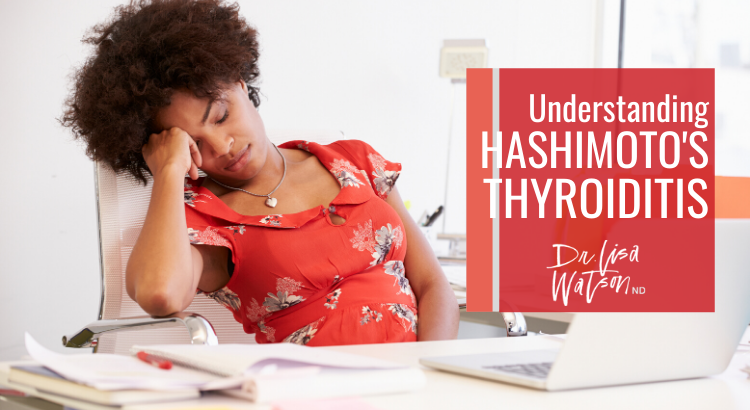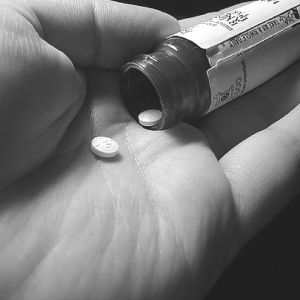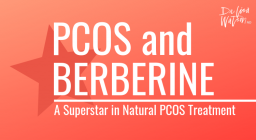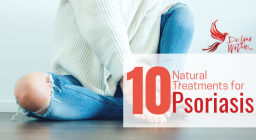
I’ll bet that 10 years ago you had never even heard of Hashimoto’s. So why are so many people talking about it now?
It’s because Hashimoto’s thyroiditis (most often just called Hashimoto’s or even ‘Hashi’s’) is the most common cause of hypothyroid symptoms – and very few doctors are taking the time to appropriately diagnose it. WTF, right?
Impacting up to 1 in 10 people, with women accounting for the majority of cases of Hashimoto’s, many of them don’t even realize it. Statistics suggest that up to 50-60% of people who are hypothyroid don’t even know it. That’s a lot of women (and men too!) walking around, feeling exhausted and unwell, without understanding why or receiving appropriate treatment.
What is Hashimoto’s Thyroiditis??
Hashimoto’s thyroiditis is an autoimmune condition in which the body’s own immune cells attack and destroy the thyroid gland. This leads to a damaged thyroid, and corresponding decrease in thyroid function, or hypothyroidism.
Hashimoto’s most often impacts young and middle aged women (20’s to 50’s) and can lead to permanent damage of the thyroid gland and lifelong hypothyroidism.
Symptoms of Hashimoto’s Thyroiditis

Hashimoto’s thyroiditis in it’s early stages is often silent with few to no symptoms. Some people experience a sense of fatigue or not feeling their best, but often do not seek medical care for these common symptoms.
The symptoms of Hashimoto’s are indistinguishable from other forms of hypothyroidism:
- Weight gain
- Fatigue
- Swelling
- Muscle weakness
- Constipation
- Cold intolerance
- Dry skin
- Dry or brittle hair
- Hair loss
- Firm or nodular thyroid gland on palpation
Diagnosing Hashimoto’s Thyroiditis
All hypothyroidism is diagnosed using a thyroid stimulating hormone (TSH) level. TSH is produced in the pituitary gland and tells the thyroid gland to make thyroid hormones. If the TSH is too high, that means the thyroid is not working effectively and a diagnosis of hypothyroidism can be made.
For most medical doctors, this is where the testing ends. However, if we want to truly understand the cause of hypothyroid symptoms we need to go deeper. In Hashimoto’s thyroiditis anti-thyroid antibodies (antithyroid peroxidase, antithyroglobulin) are most often present and indicate an autoimmune origin to the hypothyroidism.
In my Naturopathic practice I suggest every woman with hypothyroidism be tested for thyroid autoimmune antibodies – it is impossible to adequately treat the thyroid without this information and woman deserve to know.
Why Autoimmune Status Matters So Damn Much
An autoimmune condition is any condition where the body’s immune system begins to attack the body’s own tissues rather than the viruses and bacteria it is designed to fight. Hashimoto’s thyroiditis happens when the immune system attacks the thyroid gland. Ultimately it’s not really a thyroid condition, but an immune condition where the thyroid is the unfortunate victim.
Once a person develops one form of autoimmune condition they are more likely to develop others. The incidence of Hashimoto’s is higher in people with pre-existing autoimmune conditions such as celiac disease, rheumatoid arthritis, psoriasis, vitiligo and lupus.
This is one reason autoimmune status matters so much. Not only do we need this information to support the hypothyroid symptoms, but we need it to regulate and balance the immune system so that we are not leaving women vulnerable for further autoimmune diseases and the poor quality of life associated with those diagnoses.
Conventional Treatment of Hashimoto’s
Conventional treatment of Hashimoto’s thyroiditis does not differ significantly from treatment of other forms of hypothyroidism. The main treatment is L-thyroxine (T4) – also known as Synthroid taken daily in the morning. This T4 is then converted in the body to the active thyroid hormone, T3.
There are controversies regarding this treatment for Hashimoto’s thyroiditis. Studies have shown that combined use of T4 and T3 results in better relief of hypothyroid symptoms than T4 alone. This is accomplished by using a dessicated thyroid extract, prescribed to you by your Medical Doctor, endocrinologist or Naturopathic Doctor.
Another controversy in the treatment of Hashimoto’s is the lack of treatment targeted at the immune system. The use of L-thyroxine does not prevent or treat the inflammation and autoimmune destruction of the thyroid nor does it lower anti-thyroid antibodies.
Naturopathic Treatment of Hashimoto’s Thyroiditis
An experienced Naturopathic Doctor can be an amazing ally in the treatment of Hashimoto’s. Your ND can personalize a protocol that will address the root cause of your Hashimoto’s – an overactive immune system.
In Ontario your ND may be able to prescribe dessicated thyroid, provided they have obtained additional education and a license to prescribe.
Nutritional supplements, such as selenomethionine, inositol, N-acetyl cysteine, and vitamin D may also be used to decrease autoimmune thyroid antibodies. Dietary support such as gluten avoidance, immunoglobulin food sensitivity testing, celiac testing, detoxification support, gut healing protocols and more can also be used to support the immune system and decrease over-reactivity.
More information on the Naturopathic treatment of Hashimoto’s Thyroiditis can be found in the following articles: Hashimoto’s and Gluten, Naturopathic Treatment of Hashimoto’s Thyroiditis, Hashimoto’s and Fertility. You can also book an appointment with Dr. Lisa Watson, ND and finally get a handle on your hypothyroidism, and how to treat it appropriately.
Disclaimer
The advice provided in this article is for informational purposes only. It is meant to augment and not replace consultation with a licensed health care provider. Consultation with a Naturopathic Doctor or other primary care provider is recommended for anyone suffering from a health problem.


















[…] Thyroiditis, please read the other articles on this website written by Dr. Lisa Watson, ND: Understanding Hashimoto’s, Hashimoto’s and Fertility, Naturopathic Treatments for Hashimoto’s. If you are ready to start […]
[…] Hashimoto’s thyroiditis. This is an autoimmune disease that I’m starting to see more and more among mom’s groups. It is the most common cause of hypothyroidism, a condition with results in decreased thyroid function, and its symptoms include fatigue and weight gain. Women’s health specialist Dr. Lisa Watson has a great overview of Hashimoto’s thyroiditis here. […]
[…] For women with Hashimoto’s thyroiditis, the most common cause of hypothyroidism in North America, the use of Synthroid does nothing to impact the autoimmune aspects of hypothyroidism, an issue I’ve discussed here. […]
[…] you want a quick primer on what is happening in Hashimoto’s, check out Understanding Hashimoto’s, and then come back. I’ll be here […]